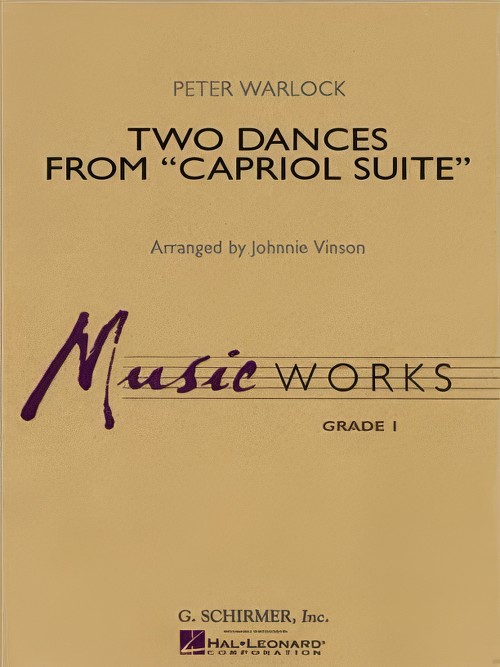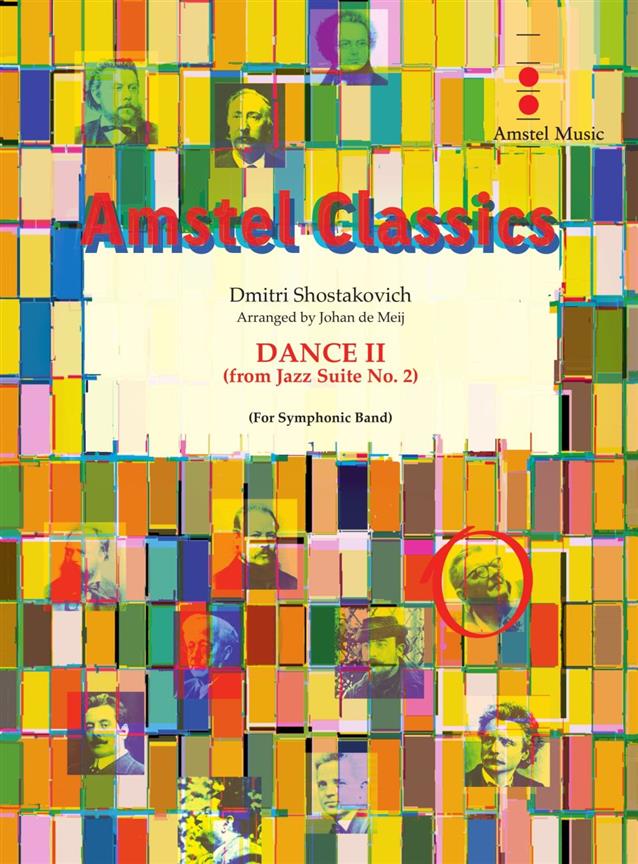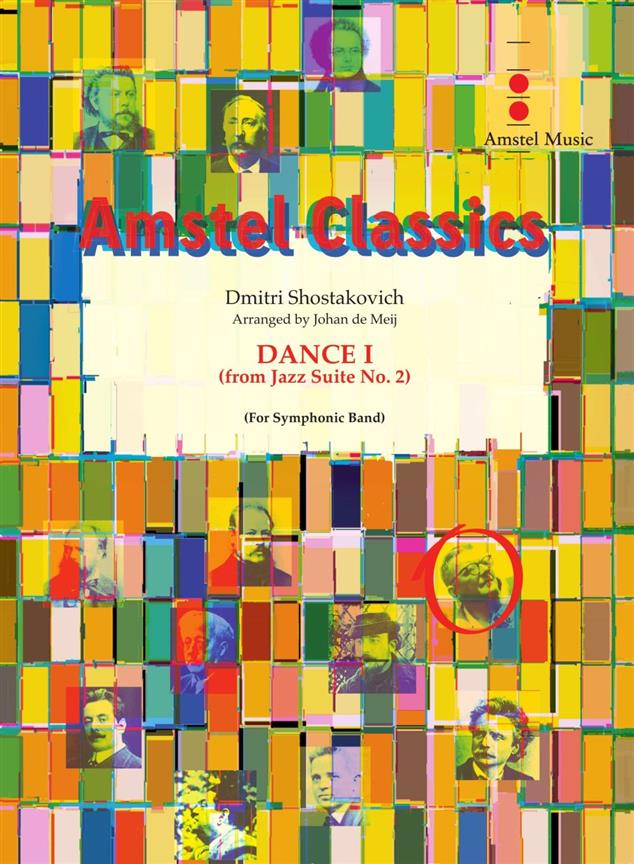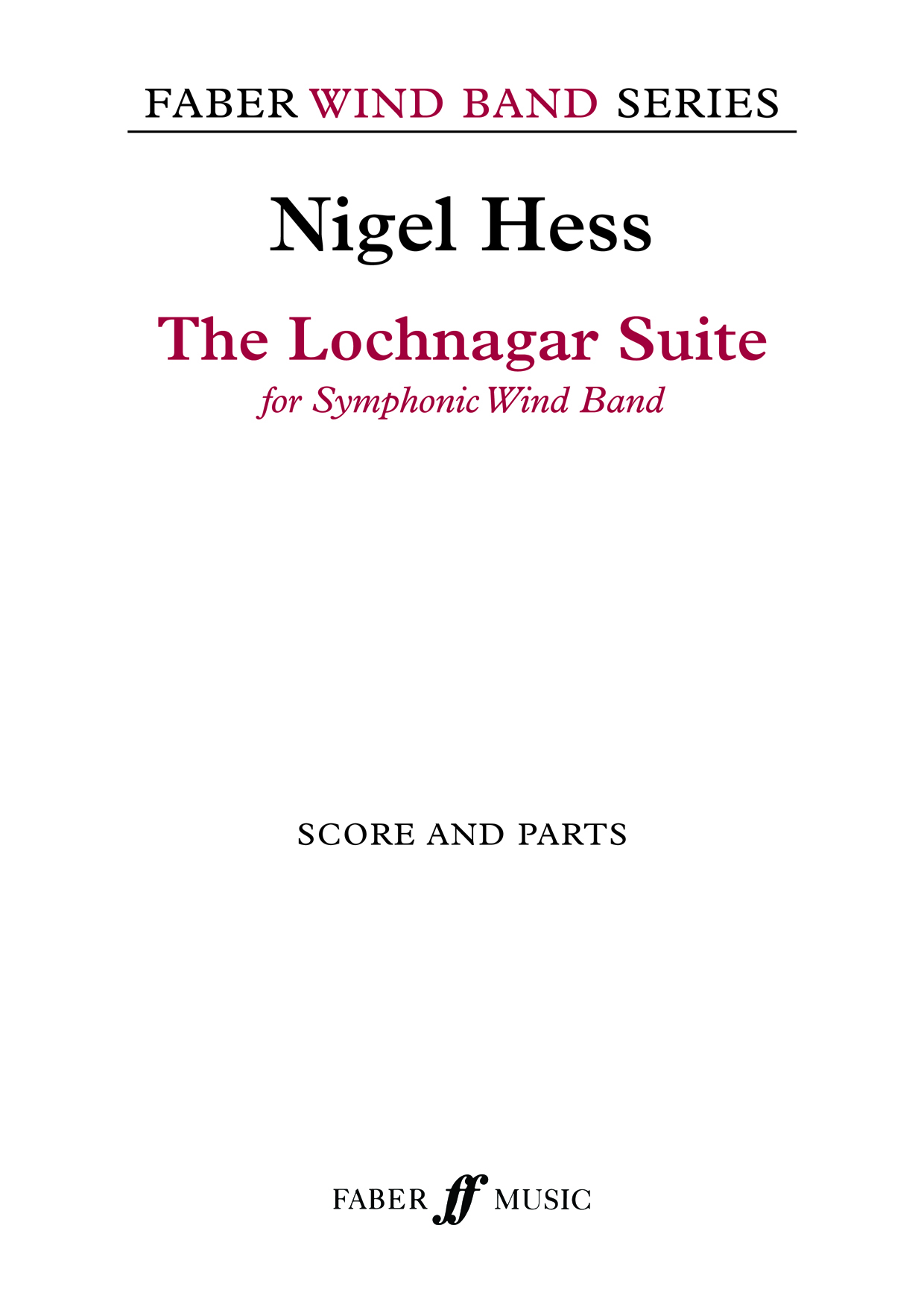Results
-
 £154.99
£154.99Piccola Suite Italiana (Concert Band - Score and Parts)
With this new suite for concert band Franco Cesarini draws on the rich repertoire of folk songs from the Friuli Venezia Giulia region of northern Italy. Between the 16th and 17th Century this rural region developed the 'furlana', a brilliant dance in 6/8 time. This catchy dance soon spread throughout Europe and became more cultivated. Fran?ois Couperin (1668-1733), Georg Philipp Telemann (1681-1767) and Johann Sebastian Bach (1685-1750) all composer of the 18th century composed 'furlane' and in the 20th Century Maurice Ravel used a 'furlana' dance his Tombeau de Couperin. Franco Cesarini follows this great tradition by using the 'furlana' as the basis for this major new concert work. 08:49
Estimated dispatch 7-14 working days
-
 £32.95
£32.95SUITE OF ENGLISH FOLKDANCES (Symphonic WB Extra Score) - Tomlinson, Ernest
Extra score only. In 1951 Ernest Tomlinson, at the invitation of his sister Freda, attended a Festival of Dance and Song presented by the English Folk Dance and Song Society. He was so captivated by the tunes danced to, that he resolved to write an orchestral suite based on some of them. The composer's arrangement for wind band follows closely the textures and colour contrasts of the orchestral original. The Suite, which is dedicated to his sister, is in six movements, all the tunes being selected from the first edition of John Playford's The English Dancing Master. Includes: Jenny Pluck Pears; Ten Pound Lass; Dick's Maggot; Nonesuch; Hunt the Squirrel; Woodicock. Duration: 12 mins.
Estimated dispatch 7-14 working days
-
 £164.95
£164.95SUITE OF ENGLISH FOLKDANCES (Symphonic WB) - Tomlinson, Ernest
Score & Parts. In 1951 Ernest Tomlinson, at the invitation of his sister Freda, attended a Festival of Dance and Song presented by the English Folk Dance and Song Society. He was so captivated by the tunes danced to, that he resolved to write an orchestral suite based on some of them. The composer's arrangement for wind band follows closely the textures and colour contrasts of the orchestral original. The Suite, which is dedicated to his sister, is in six movements, all the tunes being selected from the first edition of John Playford's The English Dancing Master. Includes: Jenny Pluck Pears; Ten Pound Lass; Dick's Maggot; Nonesuch; Hunt the Squirrel; Woodicock. Duration: 12 mins.
Estimated dispatch 7-14 working days
-
 £38.50
£38.50Two Dances from "Capriol Suite" (Concert Band - Score and Parts)
Johnnie Vinson has expertly adapted two movements from this well-known suite by Peter Warlock based on 16th-century dance music. "Basse-Dance" is a stately and moderate tempo dance in 3/4, while "Mattachins" is an energetic sword dance in 2/4. The unique stylings, and at times unusual harmonies, have been preserved in these delightful setting for beginning players. (2:20)
Estimated dispatch 7-14 working days
-
£99.99
Jazz Suite No. 2 - Dance II - Dimitri Shostakovich
In 1938 Shostakovich composed his Second Jazz Suite at the request of the recently founded State Orchestra for Jazz conducted by Victor Knushevitsky. This suite was originally scored for a complete symphony orchestra to which four saxophones, an accordion and a guitar had been added. The Jazz Suite no. 1 in three movements, composed in 1934, had been written for a smaller ensemble. The title 'Jazz Suite' is rather misleading, as the composer definitely uses the style of light music. Back in 1928, the twenty-two-year-old Shostakovich had already composed some light music. A bet among friends to make an orchestration of the popular song 'Tea for Two' in less then one hour time, causedhim to compose 'Tahiti Trot'. Shostakovich easily won the bet as he completed the original and witty arrangement within only forty minutes!
Estimated dispatch 7-14 working days
-
 £102.99
£102.99Jazz Suite No. 2 - Dance I - Dimitri Shostakovich
In 1938 Shostakovich composed his Second Jazz Suite at the request of the recently founded State Orchestra for Jazz conducted by Victor Knushevitsky. This suite was originally scored for a complete symphony orchestra to which four saxophones, an accordion and a guitar had been added. The Jazz Suite no. 1 in three movements, composed in 1934, had been written for a smaller ensemble. The title 'Jazz Suite' is rather misleading, as the composer definitely uses the style of light music. Back in 1928, the twenty-two-year-old Shostakovich had already composed some light music. A bet among friends to make an orchestration of the popular song 'Tea for Two' in less then one hour time, causedhim to compose 'Tahiti Trot'. Shostakovich easily won the bet as he completed the original and witty arrangement within only forty minutes!
Estimated dispatch 7-14 working days
-
 £94.00
£94.00Dance No. 2 (from Jazz Suite No.2) (Concert Band - Score and Parts) - Shostakovich, Dmitri - De Meij, Johan
In 1938 Shostakovich composed his Second Jazz Suite at the request of the recently founded State Orchestra for Jazz conducted by Victor Knushevitsky. This suite was originally scored for a complete symphony orchestra to which four saxophones, an accordion and a guitar had been added. The Jazz Suite no. 1 in three movements, composed in 1934, had been written for a smaller ensemble. The title 'Jazz Suite' is rather misleading, as the composer definitely uses the style of light music. Back in 1928, the twenty-two-year-old Shostakovich had already composed some light music. A bet among friends to make an orchestration of the popular song 'Tea for Two' in less then one hour time, caused him to compose 'Tahiti Trot'. Shostakovich easily won the bet as he completed the original and witty arrangement within only forty minutes!Duration: 3.45
Estimated dispatch 7-14 working days
-
 £98.00
£98.00Dance No.1 (from Jazz Suite No.2) (Concert Band - Score and Parts) - Shostakovich, Dmitri - De Meij, Johan
In 1938 Shostakovich composed his Second Jazz Suite at the request of the recently founded State Orchestra for Jazz conducted by Victor Knushevitsky. This suite was originally scored for a complete symphony orchestra to which four saxophones, an accordion and a guitar had been added. The Jazz Suite no. 1 in three movements, composed in 1934, had been written for a smaller ensemble. The title 'Jazz Suite' is rather misleading, as the composer definitely uses the style of light music. Back in 1928, the twenty-two-year-old Shostakovich had already composed some light music. A bet among friends to make an orchestration of the popular song 'Tea for Two' in less then one hour time, caused him to compose 'Tahiti Trot'. Shostakovich easily won the bet as he completed the original and witty arrangement within only forty minutes!Duration: 3.00
Estimated dispatch 7-14 working days
-
£85.00
The Lochnagar Suite (Score & Parts) - Nigel Hess
The Old Man of Lochnager is a three-movement suite for wind band based on the composer's ballet score of the same name. The Dance of the Eagle describes the majestic and dynamic Lord of the Air, who guides the Old Man on his adventures; Dark Lochnagar is a wistful arrangement of a 19th-century Scottish ballad to accompany the Old Man finding his true love; and Scottish Dances depicts a joyous Highlands dance festival during which the Old Man rediscovers his lost youth.Wind Band Grade 5: AdvancedDuration: 13 minutes.
In stock: Estimated delivery 1-3 days
-
£134.99
The Enemy God and the Dance of the Spirits - Sergei Prokofiev
The Russian ballet director Sergei Diaghilev commissioned many composers to write music for the theatre. This was what caused Serge Prokofiev to compose the four part Scytische Suite (also known as Ala and Lolli) in 1916, from which The Enemy God and the Dance of the Spirits can be heard on this CD. This suite is one of Prokofiev's first works, and received negative criticism following its first performance on account of its being "uncivilised". Prokofiev himself wrote after this first performance ". . . The timpani player beat the skin of the timpani to tatters, and the whole orchestra voiced a protest. A cellist complained that he only put up with the violence, createdby the blaring brass, on account of his sick wife and three children . . .".
Estimated dispatch 7-14 working days

